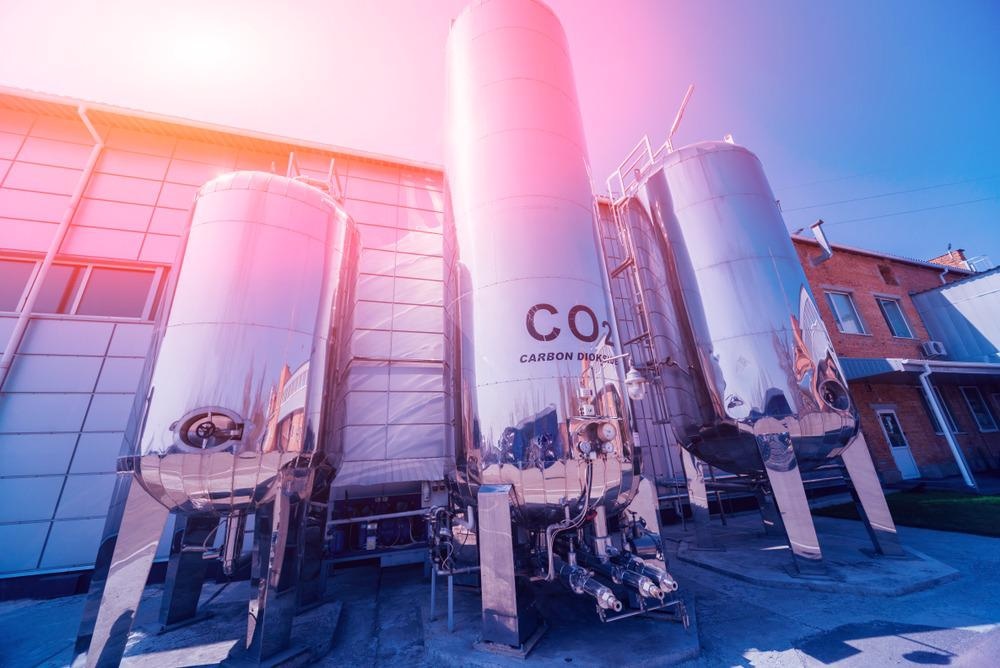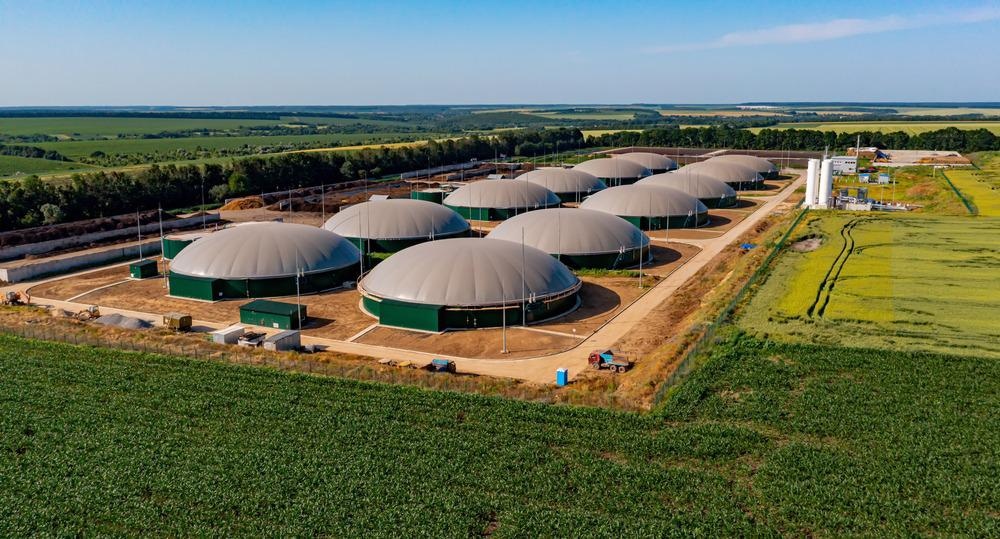The year 2020 was indicated as the globally warmest year within the decade by Copernicus Climate Change service. Data shows that Europe experienced an average 0.4°C increase in temperature in 2020 compared to the previous year. A major contributor to this ever-growing issue of climate change is the rise in atmospheric greenhouse gases including carbon dioxide, methane and nitrous oxide.

CO2 fuel. Image Credit: Roman Zaiets/Shutterstock.com
In an attempt to mitigate climate change, scientists are now investigating the use of microorganisms to convert carbon dioxide into next-generation sustainable biofuels. This application displays two major benefits to solving climate change, firstly it will help reduce carbon dioxide emissions by applying this greenhouse gas to produce biofuels. Secondly, it will provide a cleaner way of producing energy as opposed to the conventional method of using unsustainable fossil fuels.
There are two processes performed by microorganisms to convert carbon dioxide into biofuels. First, the microorganisms capture carbon dioxide, thus removing it from the atmosphere. Once it has been captured, carbon dioxide is used to produce a value-added product such as biofuels via a biological process. The most well-studied microorganisms for this application include microalgae and bacteria.
Carbon Dioxide Utilisation by Microorganisms
Carbon-fixing microorganisms such as microalgae and cyanobacteria are able to sequester carbon dioxide from the atmosphere in order to increase their biomass and utilize this to generate biofuels. This is done through several different mechanisms, the most common being through metabolic activities. Different microorganisms possess varying carbon sequestration rates.
Research has discovered six main pathways used by microorganisms to fix and utilize carbon dioxide for metabolic purposes, these can occur in aerobic and anaerobic conditions. For instance, a pathway used by photosynthetic microorganisms such as microalgae is the Calvin-Benson-Bassham cycle (CBB). This is composed of two phases: the first light-dependent phase where NADPH and ATP are produced using carbon dioxide; and the second light-independent phase where carbohydrates and lipids are produced. The key enzyme involved in this biological pathway is RuBisCo.
Another established pathway is the reductive acetylCoA pathway that occurs in anaerobic bacteria such as Euryarchaeota and proteobacteria. This pathway produces methane and acetic acid from carbon dioxide. The key enzymes include Formate dehydrogenase and Carbon monoxide dehydrogenase. Whilst the 3-Hydroxypropionate pathway used exclusively by some green non-sulfur bacteria allows for the production of 3-Hydroxypropionate utilizing carbon dioxide. This pathway is catalyzed by the key enzymes Acetyl-CoA carboxylase and Propionyl-CoA carboxylase.
These existing pathways used by microorganisms can be taken advantage of to generate biofuels for industrial applications. Real instances where these pathways have been utilized include the production of biodiesel by Serratia and Ralstonia eutropha, Bioethanol by Ralstonia eutropha H16, Biogas by Methanothermobacter and 1-Butanol by Clostridium tyrobutyricum.
Comparative Analysis of Microorganisms for Biofuel Production
Studies have compared both the advantages and disadvantages of several microorganisms in producing biofuels to help direct decisions on which microbes should be favored for application purposes. For example, cyanobacteria can easily be genetically modified, grows easily with moderate nutritional requirements and a wide range of fuels can potentially be obtained from this microorganism. However, agitation is required for their growth which increases the operational cost.
On the other hand, microalgae can be widely distributed, easily cultivated, grows quickly, utilizes carbon dioxide at a fast rate, has a higher cell density, and can also be easily genetically modified. Moreover, microalgae can produce other value-added by-products in addition to biofuels such as proteins and fertilizers, thus increasing the scope of their applications. Despite these advantages, the fuels derived from microalgae seem to have an imbalance of saturated and unsaturated fatty acids leading to low fuel properties.
The use of Archaea for biofuel production displays several advantages, most importantly the pathway utilized by Archaea contains admirable sources of thermostable enzymes such as carbonic anhydrase. However, it is a struggle to maintain growth conditions and genetic modification is difficult, so the pathway cannot be re-engineered to increase the efficiency of biofuel production.
Finally, certain bacteria possess a diverse set of carbon sources and carbon utilization pathways, are able to balance fuel properties composition and can be easily cultivated and genetically altered. However, with these types of microorganisms, there are greater chances of contamination making the process of biofuel production less efficient as quality checks will require more time and costs.

Biofuel factory. Image Credit: Terelyuk/Shutterstock.com
Future Perspectives
Although current studies show promising results for the use of microorganisms to convert carbon dioxide into sustainable biofuels, the efficiency of these microbiological pathways poses a challenge. Based on current pathways used by microorganisms for biofuel production, yield and productivity are far too low for industrial purposes.
To solve this issue, existing microbiological systems are being redesigned and genetically engineered to help improve efficiency. Furthermore, efforts are still being dedicated to discovering novel enzymes, pathways and microorganisms that may generate greater productivity and yield in the future.
References:
- Bertolini, M., Conti, F. (2021). Capture, Storage, and Utilisation of Carbon Dioxide by Microalgae and Production of Biomaterials. Environmental and Climate Technologies. 25: 574-586.
- Kumar, M., et al. (2018). Carbon dioxide capture, storage and production of biofuel and biomaterials by bacteria: A review. Bioresource Technology. 247: 1059-1068.
- Liao, J., et al. (2016). Fuelling the future: microbial engineering for the production of sustainable biofuels. Nature Reviews Microbiology. 14: 288-304.
- Thakur, I S., et al. (2018). Sequestration and utilisation of carbon dioxide by chemical and biological methods for biofuels and biomaterials by chemoautotrophs: Opportunities and challenges. Bioresource Technology. 256: 478-490.
Further Reading
Last Updated: Mar 8, 2022